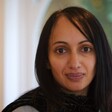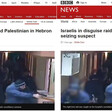Media Watch 19 August 2013

A protest outside the BBC’s London headquarters at Portland Place.
Palestine Solidarity CampaignWhile we’re used to the realities of the Israeli occupation of Palestinian land being airbrushed from BBC output, a new, alarming and very real trend has emerged — that of pro-Palestinian sentiment actively being censored by the broadcaster.
BBC viewers will witness the latest act in this trend on Friday, when BBC Four will broadcast a concert featuring the world-famous violinist Nigel Kennedy and young Palestinian musicians from the Edward Said National Conservatory of Music, based in the occupied West Bank.
The concert, originally performed on 8 August, was part of the annual BBC Proms staged in London’s Royal Albert Hall. As it neared its end, Kennedy told a cheering audience: “It’s a bit facile to say it, but we all know from the experience of this night of music that giving equality and getting rid of apartheid gives a beautiful chance for amazing things to happen.”
His comments were heard in a live broadcast of the concert on BBC Radio 3, and were included in an audio recording which could be accessed via the BBC’s website for the following seven days.
However, they will be edited from the television broadcast on Friday.
Responding to an email query from the Palestine Solidarity Campaign (PSC), a BBC spokesperson said: “Nigel’s comment to the audience at his Late Night Prom on 8 August will not be included in the deferred BBC Four broadcast on 23 August because it does not fall within the editorial remit of the Proms as a classical music festival.”
Political interference
This reasoning apparently didn’t apply to the BBC 3 recording available for seven days on the BBC’s website, which did not redact Kennedy’s remarks. However, when that recording was made available there had not yet been any political interference in the matter.
This came later in the form of Baroness Deech, a member of the House of Lords, who lobbied the BBC, calling the comments “offensive and untrue.”
Her demand to the BBC that the words be removed from the television broadcast was made despite the fact that the BBC, under the terms of its Royal Charter, is meant to be independent of Parliament.
Nevertheless, the supposedly impartial BBC appears to have complied and Kennedy’s remarks, intended to let the world know that the young musicians on stage with him suffer from inequality and apartheid under Israeli occupation, will be duly censored.
This is not the first time a renowned artist has been censored by the BBC at the Proms for attempting to highlight the struggle of the Palestinian people against Israeli occupation.
Last year, the film director Ken Loach attended a Proms performance by the West-Eastern Divan Orchestra, which consists of Israeli, Palestinian and other Arab musicians.
He was interviewed by the BBC during the interval.
Ken Loach censored
Loach later informed The Electronic Intifada that he told the interviewer: “Seeing Israelis and Arabs, including Palestinians, sitting side by side on the stage makes us confront the issue of the continuing oppression of the Palestinian people, and I shall be thinking of them when I hear the music tonight.”
Those words were cut from the interview when the concert was broadcast on television, with the BBC claiming time constraints as the reason for not including them.
A year earlier, in 2011, it had to forage for a different excuse when it edited the words “free Palestine” from a freestyle rap performed by the artist Mic Righteous on a BBC Radio 1Xtra show.
Performing on the Charlie Sloth Hip Hop M1X in February, Mic Righteous freestyled a composition about the price he’s paid for fame. But despite being famous, he said: “I can still scream ‘free Palestine’ for my pride/Still pray for peace.”
When the performance was broadcast, and again when it was repeated in April, the words “free Palestine” had been removed and replaced with the sound of breaking glass.
In response to complaints from the PSC, the BBC originally said the words had been cut because they might prove offensive to some.
When pressed on who might be offended by a call for an end to occupation, the BBC’s then head of editorial standards for audio and music, Paul Smith, said that the show’s producer “did not edit out the word ‘Palestine’ because it was offensive — referencing Palestine is fine, but implying that it is not free is the contentious issue.”
Democracy or dictatorship?
The BBC’s latest excuse for censorship — that Kennedy’s comments do not fit an editorial remit — is depressingly familiar. In April this year, BBC Four pulled from its schedule a documentary which provided archeological evidence suggesting that the Jewish exile of 70AD was a myth. It is on this story of exile that Zionism bases the “right” of the Jewish people to “return” and colonize Palestinian land.
When asked why the documentary, billed as part of a season on archeology, had been removed at the last minute, the BBC said “the film did not fit the season editorially and was not shown.”
Censoring artists and suppressing free speech and political dissent is the norm for state broadcasters in dictatorships across the world. What is worrying is when we start to see this kind of censorship being practiced by our own state broadcaster, the BBC. In a democracy, should the public not be allowed to know that Israel is engaging in apartheid and that the Palestinians are suffering as a result?
The BBC says it will not broadcast Kennedy’s Prom remarks because they do not suit a program on classical music. And yet, for centuries, art and music has been used to make political statements. Why is it so frightening for the BBC when the political statements in question turn the spotlight on Israel’s occupation and attempted subjugation of the Palestinian people?
It is understandable that Israel, the occupier, would try and stop that spotlight from being shone. What is the BBC’s excuse?






Comments
Gaza DEC appeal
Permalink Tom Suarez replied on
Ms. Saleem,
thank you for the excellent article.
Just to point out that you've not mentioned the BBC’s most horrific crime of complicity, its 2009 refusal to air the Gaza DEC appeal following Cast Lead.
BBC
Permalink Carl Morris replied on
The BBC is a publicly-funded broadcaster but that is not equivalent to it being a 'state broadcaster'. It's a key difference and vitally important that the BBC is editorially distinct from the state and government. We're not seeing this independence here though.